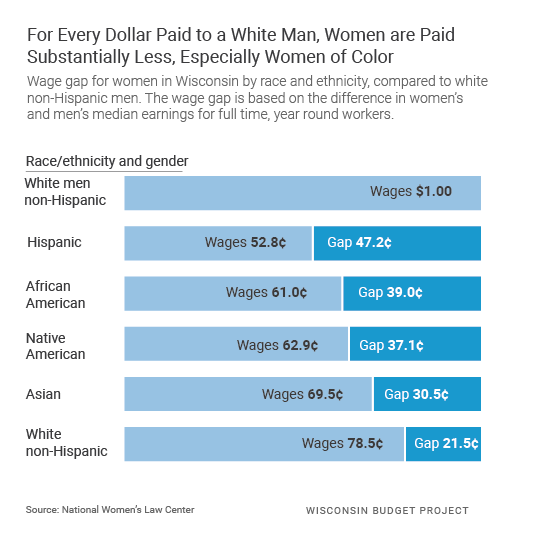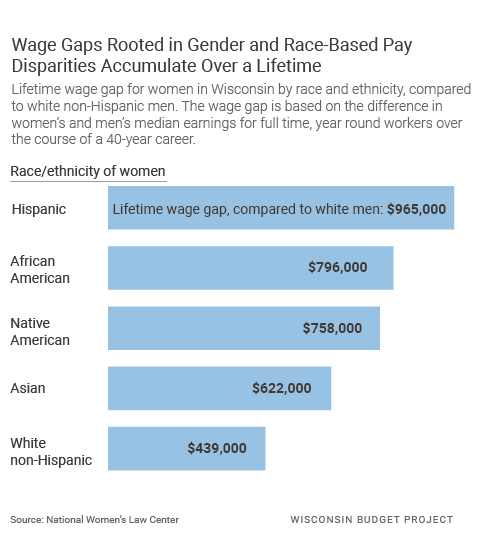Minorities Earn Far Less Than Whites
State’s average Hispanic woman earns nearly $1 million less lifetime pay than average white man.
Thursday, September 27, was Native American Women’s Equal Pay Day, which marks how long a Native American woman has to work into 2018 to bring her 2017-18 earnings to the same amount a white man made in 2017.
Native American Women’s Equal Pay day is months later than National Equal Pay Day, which fell on April 10 this year and is the date on which women overall match the earnings of men in 2017. That’s because Native American women and other women of color earn less than white women do, widening the earnings gap even further compared to white men.
Native American women in Wisconsin are paid just 62.9 cents for every dollar of earnings by white non-Hispanic men. That’s based on the ratio of women’s and men’s median earnings for full time, year round workers. Hispanic women in Wisconsin earn 52.8¢ for every dollar earned by White men, African American women earn 61¢, and Asian women earn 69.5¢. White women have the smallest gap, earning 78.5¢ for every $1 earned by White men in Wisconsin.
Those wage gaps don’t lessen with education levels. In fact, the wage gap is widest for Native American women who have the highest levels of education. Nationally, Native American women who have a professional or doctoral degree are paid just 55¢ for every $1 paid to white non-Hispanic men with similar education levels, compared to 69¢ for Native American women without a high school degree.
Native American women are over-represented in the low-wage workforce and under-represented in the high-wage workforce, as are women in general and especially women of color. But even among workers in high-wage occupations such as lawyers, engineers, physicians, or surgeons, Native American women are paid less than their white male counterparts.
It isn’t just one hour, one day, or even one year that Native American women and other women are paid less than their worth. It’s a lifetime. The lifetime wage gap accumulates to the extent that Native American women in Wisconsin earn $758,000 less than white men over the course of a 40-year career. The lifetime wage gap for Hispanic women in Wisconsin is $965,000 compared to white non-Hispanic men, $796,000 for African American women, $622,000 for Asian women, and $439,000 for white women.
These race and gender-based pay disparities devalue women, especially women of color, and rob them of opportunities to achieve financial security and establish wealth. Steps that can move us closer to equal pay include:
- Raising the minimum wage. About three-quarters of minimum wage workers in Wisconsin are women. Wisconsin’s minimum wage of $7.25 hasn’t been raised since 2009, and has lost about 15 percent of its value since then to inflation.
- Harnessing the power of the state tax code to reclaim wages lost to institutionalized sexism and racism. Wisconsin should increase credit amounts for the state’s Earned Income Tax Credit, which boosts income for parents who work and have low or moderate incomes. Wisconsin should expand the EITC so that workers without children are eligible for the credit as well.
- Implementing family-friendly policies, and making sure that all women have access to them. That means making sure that working parents have access to high-quality, affordable child care regardless of where they are in the state. It also means providing paid family and medical leave that includes job protections, anti-discrimination protections, and a 100 percent wage replacement rate at low incomes.
Wisconsin Budget
-
Charting The Racial Disparities In State’s Prisons
 Nov 28th, 2021 by Tamarine Cornelius
Nov 28th, 2021 by Tamarine Cornelius
-
State’s $1 Billion Tax Cut Leaves Out 49% of Taxpayers
 Sep 21st, 2021 by Tamarine Cornelius
Sep 21st, 2021 by Tamarine Cornelius
-
TANF Program Serves a Fraction of Poor Families
 Aug 30th, 2021 by Jon Peacock
Aug 30th, 2021 by Jon Peacock
























